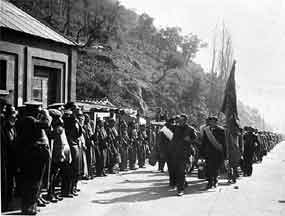President Obama made excellent use of plain language during last night's speech about the budget debate. Although the use of plain language has spread through most government offices, Presidents are still expected to sound "presidential". Obama--oratorically gifted almost to a fault--managed to break through that "presidential" wall of tone momentarily early in the speech when he prefaced his apposing of two budgetary visions with this: "I won't bore you with the details of every plan or proposal". This translates as a favor to the audience; he is suddenly about to do you a favor by interrupting your evening with a summarized account of the budget debate.
Speech content was well organized. He first portrayed the deficit as everyone's problem, giving concrete examples of how it affects both private transfers of capital and monies within social programs. He then laid out the two visions that reflect the mindsets of each side of the debate: The first plan is "balanced"--like its planners. "The only reason this balanced approach isn't on its way to becoming law right now is because a significant number of Republicans in Congress are insisting on a cuts-only approach--an approach that doesn't ask the wealthiest Americans or biggest corporations to contribute anything at all." I had not heard Obama call out Republicans by party name before.
Next he recruited John Boehner and Ronald Reagan, and counted them among the balanced. I imagine he hoped this move, made only minutes before the Speaker's rebuttal, would lead some of the audience to doubt Boehner. Then Obama tried to explain the meaning and risks tied to the debt ceiling: "Understand--raising the debt ceiling does not allow Congress to spend more money." But this proved to be the low point of the speech; while his first discussion of risks concerned the debt, and this later portion of the speech covered the debt ceiling, Obama failed to differentiate the two and, as a result, sounded repetitive to me.
The President then argued against a short-term solution by saying, "Based on what we've seen these past few weeks, we know what to expect six months from now." Sure: Another ridiculous, stressful, embarrassing, frustrating, and dangerous debate. Then he appealed to American Exceptionalism: "That is no way to run the greatest country on Earth. It is a dangerous game we've never played before, and we can't afford to play it now. Not when the jobs and livelihoods of so many families are at stake. We can't allow the American people to become collateral damage to Washington's political warfare."
A common rhetorical move for politicians now is to conjure the divide between Washington and the rest of the country. And this is the only divide politicians recognize. Obama followed suit, portraying the voting public as united. He tried to tap into peoples' frustrations: "But do you know what people are fed up with most of all? They're fed up with a town where compromise has become a dirty word ... all they see is the same partisan three-ring circus here in Washington. They see leaders who can't seem to come together and do what it takes to make life just a little bit better for ordinary Americans. They are offended by that. And they should be." He never used the word Democrat; he positioned himself with bipartisan support as the familiar, allied with the fed up people, and he positioned the new Republicans as the other.
President Obama concluded with an interesting appeal: "History is scattered with the stories of those who held fast to rigid ideologies and refused to listen to those who disagreed. But those are not the Americans we remember. We remember the Americans who put country above self, and set personal grievances aside for the greater good. We remember the Americans who held this country together during its most difficult hours; who put aside pride and party to form a more perfect union."
There are two American values that seem to conflict with each other: Self-sacrifice vs. self-reliance. Each is perpetuated by its own myths, and each must be invoked carefully. Self-sacrifice surfaces during war and economic struggle: It promoted rationing during WWII, and Truman recognized later it after the German surrender: "Let us not forget, my fellow Americans, the sorrow and the heartache which today abide in the homes of so many of our neighbors -- neighbors whose most priceless possession has been rendered as a sacrifice to redeem our liberty." He followed this with his formal proclamation: "The Allied armies, through sacrifice and devotion and with God's help, have wrung from Germany a final and unconditional surrender." I don't know that this appeal translated here in the President's speech; he said, "America, after all, has always been a grand experiment in compromise". I image some Americans would not give ground on that.
 Every time stock market indices drop X amount of points and make headlines, media gives us "worried trader" pictures--guys covering their mouths or rubbing their temples with faces turned up in disbelieving horror or down in dejection. In a sense, this is a non-story because the market is a bet and it goes on everyday. This practice of recycling the "worried trader" is akin to putting front page a candid photo of the defeated gambler sweatily clutching his tickets after Thursday's horse races.
Every time stock market indices drop X amount of points and make headlines, media gives us "worried trader" pictures--guys covering their mouths or rubbing their temples with faces turned up in disbelieving horror or down in dejection. In a sense, this is a non-story because the market is a bet and it goes on everyday. This practice of recycling the "worried trader" is akin to putting front page a candid photo of the defeated gambler sweatily clutching his tickets after Thursday's horse races.
















